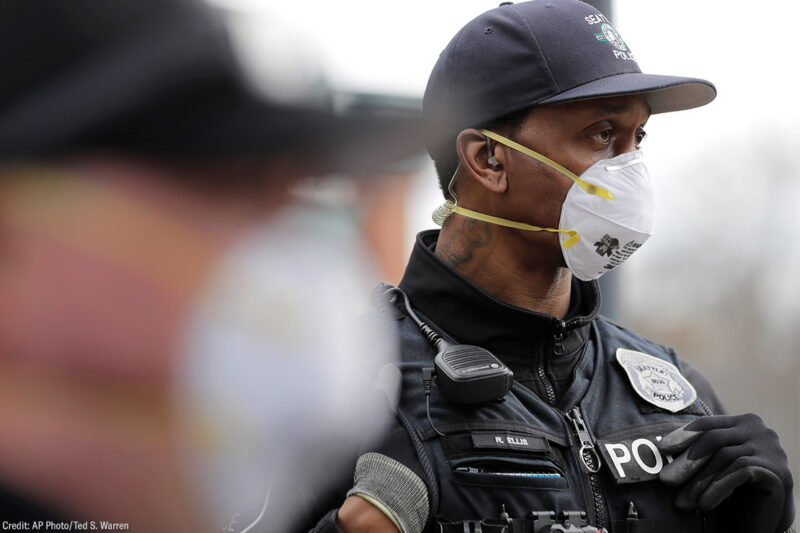Police are Enforcing Public Health Orders, but that Doesn't Make them Public Health Experts


In a desperate effort to slow the spread of COVID-19, state and local officials are following the advice of public health experts to impose severe restrictions on American life, such as social distancing and shelter-at-home orders. Unfortunately, the institutions that have the most resources available to carry out this task are not public health, medical, or housing authorities. They are our law enforcement and criminal legal systems, which typically operate by criminalization and punishment.
There’s a bitter irony to this: The tactics that law enforcement officials frequently use to protect people —arrests and detention — are more likely to put people in harm's way. As the ACLU, public health experts, and many law enforcement officials have warned, jails are “petri dishes” for the spread of COVID-19. In New York City’s Rikers Island jail, for example, the jail’s chief doctor says that despite the best efforts of medical staff, there is “a public health disaster unfolding before our eyes.” The answer to this problem is clear: Authorities must reduce jail populations both by limiting arrests and releasing the people who are already held in jail.
While we may need to accept restrictions on mobility that public health authorities identify as necessary during this crisis, these restrictions must be narrowly tailored and enforced equitably. In spite of public health guidance, across the country, police continue to arrest people for failures to socially distance, which only exacerbates jail crowding and forces more people into dangerous conditions. This endangers their lives — along with the lives of their families, jail staff and their families, and the broader community. In Puerto Rico, for example, police have arrested more than 500 people for violating an island-wide 9 p.m. curfew, even as police stations shut down due to officers being quarantined.
Just as police crackdowns for drug offenses are disparately focused on the most marginalized communities, we are concerned that COVID-19 related restrictions will be targeted at and most aggressively enforced against people of color and low-income people — not because of race-based differences in the underlying conduct, but because of racially disparate police enforcement patterns. As with the well-documented disparate enforcement of drug offenses, there are an increasing number of examples of wealthy white people refusing to follow public health guidance but not suffering the same criminal justice consequences as Black, brown, and poor people.
Such punitive enforcement often overlaps with other law enforcement practices that endanger public health, including continuing to make arrests for low-level offenses and detaining people based on suspected immigration status. For example, last week in Elkhart, Indiana — a city that already has a troubling record of police misconduct — officers stopped a Latino driver, arrested him for driving with a suspended license and violating the governor’s emergency travel order, and then held him in jail on an ICE detainer.
It’s important for police chiefs to ensure more equitable enforcement patterns, as well as to be sensitive to the fact that many employees of businesses deemed essential are part of groups often subject to police harassment. These employees need to be able to go about their daily work and errands without constantly being stopped and forced to prove their essential status.
Additionally, while officers are neither public health nor medical experts, and are unlikely to receive this training in a moment of crisis, it’s critically important for law enforcement leaders to communicate to officers that they cannot arrest their way out of this pandemic. Instead, they must adopt tactics that reflect their public health role.
The goal of these tactics should be to promote public health by preventing harm. Instead of making custodial arrests, officers should explain the rules, issue a warning, and engage in creative, compassionate problem-solving. Sheltering at home, after all, is easiest for people who are financially comfortable and have a stable home life. When people who lack this stability — people who are unhoused, people who are experiencing domestic violence, and teens who are stuck in unstable homes without the refuge of school — have difficulty complying, it’s important for officers to try to address underlying issues in conjunction with public health authorities, rather than using a crackdown to spur compliance.
Additionally, even when a person lacks a reason for violating the restrictions, officers should keep in mind that financial sanctions can have serious ramifications, especially given the economic disruption caused by COVID-19. Although some public health orders give officers the authority to issue citations that create a criminal record and carry substantial fines, this should be a last resort.
Fortunately, most jurisdictions — with some disturbing exceptions — say they are not using arrest as the primary means of enforcing these orders. For example, in Charlotte, North Carolina, the police department intends to “manage the order through voluntary compliance, education, dialogue, and cooperation” with enforcement actions being used as a “last resort.” In Pennsylvania, Gov. Tom Wolf stated that law enforcement will focus on ensuring residents are aware of the order and informing the public of social distancing practices rather than enforcement. That said, it is important to monitor whether on-the-ground practices match these public announcements; in New York City, multiple people have already been arrested for “fail[ing] to maintain social distancing” despite the mayor’s statements that such violations would be addressed through warnings and fines.
Given the heavy role that law enforcement will play in promoting compliance with public health restrictions, local residents should urge their police departments to issue clear guidance to officers on how to wield these powers responsibly and with compassion and empathy. If not, enforcement could result in the same patterns of police abuse that communities of color and low-income communities already experience. The risks of adopting a traditional, punitive law enforcement approach are too high, not only for those targeted, but for the community as a whole.

